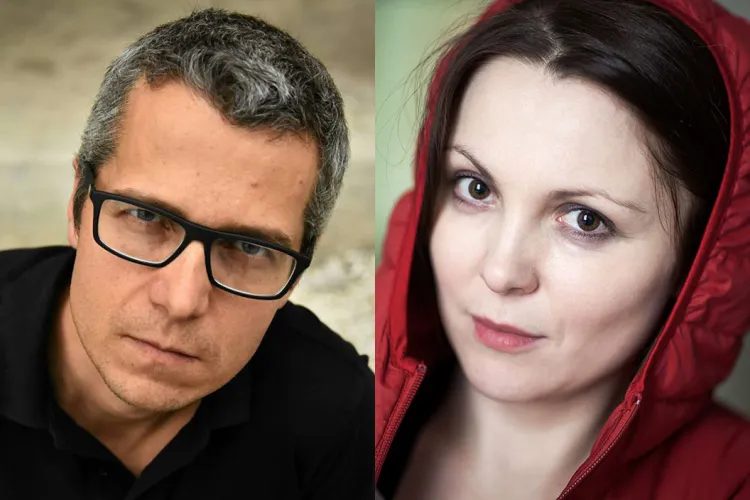Visiting Cornell Professors in Theater Michał Zadara ’99 and Barbara Wysocka Seek New Perspectives

Michał Zadara ’99 and Barbara Wysocka (Photos courtesy of Agencja Gazeta and Konrad Pustoła, respectively)
For Michał Zadara ’99 and Barbara Wysocka, the next year is all about rattling perspectives.
The pre-eminent Polish director and actress/director return to Swarthmore as Julien and Virginia Cornell Visiting Professors. They’re eager to find new rhythms for themselves and give students a fresh view on approaching and creating theater.
“I’ve directed about 50 plays over the last 20 years—that’s a lot of time spent telling actors what to do, coming up with ideas for sets and lighting, all of that stuff,” says Zadara, who in 2007 received a Passport Award, roughly the Polish equivalent to a Pulitzer Prize, in recognition of his first 12 productions.
“So I’m excited to take a new approach to things, to both reflect on and deepen the intellectual well that I draw upon for my work.”
For Wysocka, too, the past 15 years have been a blur of creativity.
“I was acting, directing theater and opera, and making films and installations,” she says. “Now, I have a one-year break in this run. I can focus on looking for some new ways to think about where I would like to go with my work.
“This is a unique opportunity for me to stop, take a deep breath, and begin something new,” adds Wysocka, who also earned a Passport Prize, in 2009, for her debut opera production of Philip Glass’s The Fall of the House of Usher.
Wysocka will collaborate with Swarthmore students this spring, through a course that examines Heiner Müller’s adaptations of three Shakespearean tragedies: Macbeth, Hamlet, and Titus Andronicus. The only prerequisite? An open mind.
“Students will learn how to create performance, and I will try to encourage them to find their own ways of expression and translate that into art that connects to the world,” Wysocka says. “I hope they’ll be interested in taking this risk with me.”
Zadara, too, will examine tragedy, but from the Greek tradition. Focusing on eight or nine plays this fall, he and his students will reimagine plays from 3,000 years ago as cutting-edge.
“Greek tragedy was such a different way of writing and performing and engaging with theater, which gives us the opportunity to challenge our thoughts of what theater is today,” Zadara says, adding that the course is open to all.
“We will use these plays to explode our notions of what is possible.”
The Cornell visiting professorships are also a way for Zadara and Wysocka to deepen their ties to Swarthmore, to which they brought Chopin Without Piano for a weeklong residency in 2015. Both look forward to collaborating with and tapping into the energy of the College community.
“One of the more exciting aspects about being here is the chance to meet all these people who are experts and also very excited to engage with you in their areas of knowledge,” says Zadara. “You don’t see that as much at European institutions, where people tend to keep a distance from their subject matter to appear objective and cool.
“That’s one of the biggest pluses for me here: the opportunity to talk to interesting people about interesting things all of the time,” he says.
“It will be a symbiotic relationship,” adds Wysocka. “I am excited to collaborate with different departments. Theater is a combination of text, film, documentary, music, dance, sculpture, and many other things. It is open for everything; it has no borders. I am interested in how the students will define their own theater. It can be an adventure for them and for me as well.”



